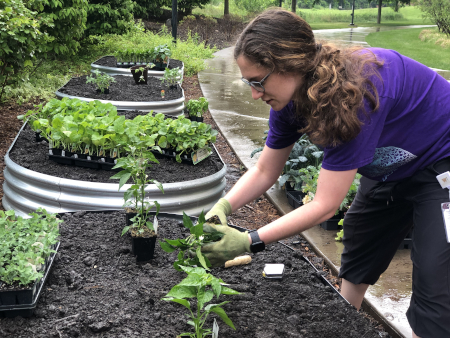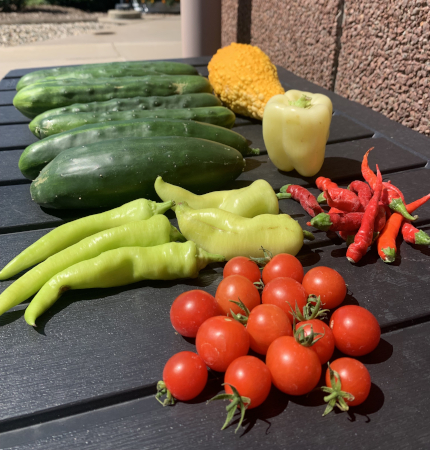
When a group of WMed students launched a garden interest group last year, they were determined to have an impact on the local community by finding a way to be a source to help those in need of food.
Their initial idea was to start a food pantry at the medical school but space for such an endeavor proved to be a challenge. Undeterred, they turned their attention outdoors and came up with a new plan.
“We figured if we didn’t have space for a food pantry inside, then what about growing the food outside?” said M2 Tiffany Hangse, one of four student leaders for the Garden Interest Group.
So, earlier this year, Hangse, along with M2s Noelle Fukuda, Samantha Mazurek, and Jennifer Vosters, began looking for a way to put in place an outdoor garden at the W.E. Upjohn M.D. Campus. Their idea received resounding support from their classmates, as well as WMed Dean Paula Termuhlen, MD, and they were able to break ground this past June.
Since then, the garden – which is made up of four raised beds and located in the southwest corner of the W.E. Upjohn M.D. Campus – has flourished and students have been able to donate more than 100 pounds of fresh produce to Kalamazoo Gospel Ministries and Loaves and Fishes.
“We didn’t start off with a goal in mind,” Vosters said. “I was honestly just hoping we could get the garden started and be able to donate something so being able to say that we’ve donated more than 100 pounds of fresh produce is beyond anything I thought we could have ever done this soon.”

The students said the early success of the garden would not have been possible without the immense support they’ve received from members of the WMed community, as well as the surrounding community. Vosters said that once she and her classmates knew the garden would become reality, they reached out to several local greenhouses, including Great Lakes Greenhouse, Pineview Greenhouses, and Wedel’s Nursery, Florist and Garden Center, who donated trunk loads of starter plants for the new garden.
And at WMed, the students said leaders and faculty embraced the project with the medical school’s Wellness Initiative and Office of Development and Alumni Affairs providing funding for the purchase of the planter boxes and soil. Erik Larson, PhD, professor in the Department of Biomedical Sciences, serves as the group’s faculty advisor, and students have an Instagram account they use to document the interest group’s activities and progress.
“We couldn’t have gotten where we are without all of the support,” Vosters said. “Also, honestly, I think where the most happiness comes from for me is when we’re outside tending to the plants and so many people walk by and say how much it means to them to see the garden. I had one person tell me it makes them happy every day when they come into work and another person said the garden is the best addition they’ve seen to the medical school.

“It’s a sense of wellness people get from just walking by,” she added. “They can see the plants growing and how WMed is making a difference in the community and it’s priceless how that makes you feel.”
Hangse and Fukuda said they have also has enjoyed seeing the amount of joy and “sense of community” the garden has provided at WMed.
“People sign up to water the garden, others will help weed the garden,” she said. “We wanted it to be a garden with the entire WMed community and it’s been really cool to see how everyone has come together around that.”
“You get to have more conversations with people you might not usually see at the medical school,” Fukuda added. “That’s been really, really fun.”
Mazurek, who serves as the interest group’s main gardening expert, said the garden has produced an array of different vegetables since June, including zucchini, cucumbers, lots of tomatoes, different varieties of peppers, broccoli, kale, squash, and butternut squash. Recently, she said the group used some tomatoes from the garden to make homemade spaghetti sauce that was served at an event for their fellow students.
Looking ahead, Mazurek said members of the garden interest group hope to begin succession planting during the winter months and start their own seedlings for planting in the spring.
“We could produce a lot more by doing succession planting and there are lots of produce we weren’t able to do this first year that we can do next year, including spring onions, potatoes, and carrots,” she said. “There are lots of spring crops we could do that are really popular for cooking.”
More immediately, Hangse said the garden was recently approved – beginning this January – as a site for the medical school’s Engagement and Discovery program, a 17-month service-learning endeavor that begins for students during their first year at WMed. She said that will allow more students the opportunity to work with the in the garden with the interest group. Additionally, she said she and the other leaders of the interest group are hoping to connect with local elementary schools to provide programming to young students to teach them about health and nutrition and get them excited about gardening and the process of growing their own food.
“Our number one goal is to have the garden become even more integrated with the medical school so that’s why we wanted it to be a site for the Engagement and Discovery program so even after we’re busy in our third and fourth years as students, there will always be someone taking care of the garden and making sure it continues to be successful going forward,” Hangse said.
To learn more and support the Garden Interest Group, check out the medical school's Student-Led Philanthropy Projects webpage.
